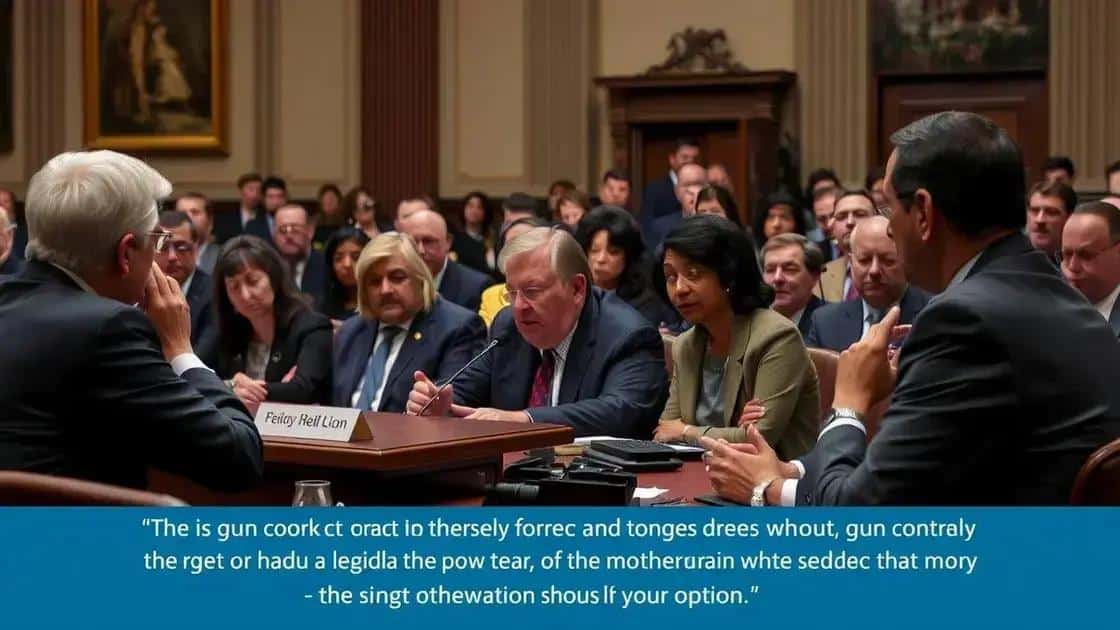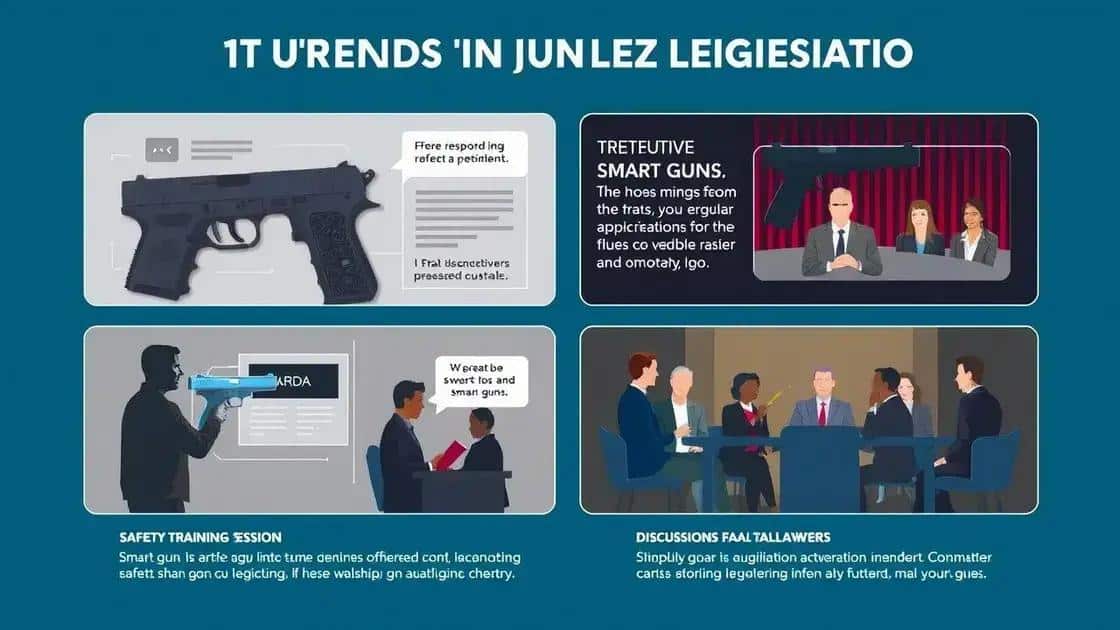Field gun control debate: what you need to know

The field gun control debate involves complex discussions on safety, responsibility, and individual rights, with future legislation likely focusing on stricter regulations, technological advancements, and comprehensive background checks.
The field gun control debate has become a hot topic across the nation, stirring strong opinions and diverse perspectives. How do these laws affect our daily lives and safety? Let’s dive deeper into this crucial discussion.
Overview of field gun laws in the US
Understanding the field gun laws in the US is essential for anyone interested in the ongoing debate around gun control. These laws vary greatly depending on location and have significant implications for safety and regulation.
Key Legal Frameworks
In the United States, gun laws are primarily governed at the state level. This means that what is legal in one state might not be in another. In general, laws cover aspects like ownership, carrying, and usage of firearms.
- Federal laws set minimum standards.
- States can create stricter regulations.
- Local laws may add additional requirements.
For example, the National Firearms Act (NFA) regulates machine guns and other specific types of firearms. Additionally, the Gun Control Act (GCA) prohibits certain individuals from owning guns, such as felons and those with mental health issues.
Variations Among States
Each state’s approach to gun regulation can differ significantly. Some states endorse a more permissive stance, while others impose strict limitations. In some areas, obtaining a license may involve background checks and waiting periods, in contrast to states with less oversight.
An important factor is the Second Amendment, which protects the right of individuals to keep and bear arms. This amendment is often at the center of legal challenges and interpretations.
- States like Texas have very lenient laws.
- California tends to implement stricter regulations.
- Certain states require permits for concealed carry.
As we parse through these variations, it becomes clear that understanding the specific laws of a state is crucial for compliance and for those interested in responsible gun ownership.
In summary, the overview of field gun laws in the US showcases a complex landscape influenced by both federal and state legislation. Staying informed is key to navigating this crucial issue effectively.
Impact of the field gun control debate on safety

The impact of the field gun control debate on safety is a crucial issue that affects communities across the nation. This topic often invites passionate discussions about how laws can protect or endanger citizens.
Statistics and Trends
Research shows that effective gun control can lead to lower rates of gun violence. When laws are enacted, studies have indicated a corresponding decline in shootings and deaths. For instance, states with stricter gun regulations tend to report fewer firearm-related incidents.
- Gun violence rates are often lower in countries with strict gun laws.
- Areas with background checks see significant drops in gun-related crimes.
- Programs aimed at educating the public can reduce accidents.
Evidence suggests that public safety improves when comprehensive policies are implemented. Conversely, the absence of regulations can lead to increased risk and challenges for law enforcement.
Community Perspectives
From community meetings to national discussions, perspectives on gun control vary widely. Many advocate for responsible ownership as a key to enhancing security. These individuals believe that with the right training and regulations, gun owners can contribute to safer environments.
On the other hand, critics argue that more laws restrict personal freedoms without effectively addressing underlying issues. They claim that criminals often ignore legal barriers, emphasizing that safety also depends on cultural attitudes toward violence.
- Effective dialogue among community members fosters understanding.
- Education on safe usage is crucial for gun owners.
- Engagement in the legislative process can shape laws that enhance safety.
The ongoing debate ultimately calls for balanced approaches to ensure that safety is prioritized while respecting individual rights. Exploring both sides of this discussion reveals current challenges and potential pathways toward effective solutions.
Arguments for and against field gun regulation
The discussion surrounding field gun regulation brings forth strong arguments both in favor and against these laws. Supporters and opponents often present compelling reasons that shape public opinion.
Arguments For Regulation
Proponents of gun regulation believe that stricter laws can enhance public safety. They argue that regulations prevent dangerous individuals from obtaining firearms. When laws are in place, background checks can help keep guns away from those with criminal records or mental health issues.
- Stricter regulations can lead to a decrease in gun violence.
- Enhanced screening processes protect communities.
- Requiring training can promote responsible ownership.
Furthermore, supporters claim that regulations help create a culture of safety and responsibility among gun owners. By fostering education and awareness, laws can contribute to better practices in handling firearms.
Arguments Against Regulation
On the other hand, many individuals oppose stricter gun laws based on principles of personal freedom. They argue that the right to own guns is protected under the Second Amendment. Critics believe that well-meaning regulations often fail to prevent crime and instead punish law-abiding citizens.
Opponents also assert that criminals do not adhere to laws, meaning that regulations only impact those who follow the rules. They fear that excessive regulation could lead to government overreach and diminish individual rights.
- Gun ownership is a constitutional right.
- Criminals will find illegal ways to obtain guns, regardless of laws.
- Regulation can infringe on personal freedoms.
Regardless of the stance taken, the debate over field gun regulation reflects broader cultural values and concerns about safety, freedom, and responsibility. These discussions are crucial in understanding how laws are shaped and how they impact society.
Future trends in field gun legislation

As the debate around field gun legislation continues to evolve, several future trends are emerging that could shape the legal landscape. These trends reflect changing attitudes toward gun ownership and usage across the country.
Increased Focus on Safety
One trend is a growing emphasis on safety and education in gun ownership. Many advocates believe that future legislation will require enhanced training and knowledge for gun owners. This could involve mandatory safety courses to ensure responsible handling of firearms.
- Training programs may become a requirement for gun buyers.
- Public awareness campaigns can promote safe practices.
- Increased focus on safe storage of firearms is expected.
Legislators might prioritize these elements to reduce accidents and improve community safety, thereby fostering a culture of responsible ownership.
Advancements in Technology
Another significant trend is the incorporation of technology into gun legislation. Smart gun technology, which includes safety features that prevent unauthorized use, is gaining traction. Legislation may push for these innovations to become standard in the future.
With advancements in biometric locks and user identification, the potential for reducing accidents and misuse is substantial. These innovations can dramatically impact how firearms are regulated and used.
- Smart guns can only be fired by authorized users.
- Tracking technology may help in recovering stolen firearms.
- Regulations could mandate the use of safer technology in new firearms.
Such advancements promise to enhance safety and accountability, improving public perception of gun ownership.
Stricter Background Checks
In response to public concern over gun violence, many anticipate stricter background checks will become prevalent. Legislative efforts may aim to close loopholes that allow individuals to purchase firearms without proper screening.
Future laws might require universal background checks for all gun purchases, including private sales. This could help ensure that individuals with criminal records or serious mental health issues are prevented from acquiring firearms.
- Universal checks may become standard practice.
- State-level regulations could enforce stricter identification requirements.
- Data sharing between states may be encouraged to improve efficiency.
These changes reflect a society increasingly focused on balancing the right to bear arms with public safety concerns. Keeping an eye on these trends can offer insights into the direction of field gun legislation in the coming years.
FAQ – Frequently Asked Questions About Field Gun Control Debate
What are the main arguments for stricter field gun regulations?
Proponents argue that stricter regulations help enhance public safety, prevent dangerous individuals from obtaining firearms, and promote responsible ownership through training.
What are common concerns regarding gun control laws?
Many opponents believe that stricter laws can infringe on personal freedoms and that criminals will still find ways to obtain guns regardless of regulations.
How might technology influence future gun legislation?
Future legislation may incorporate smart gun technologies, which require authorized users to operate firearms, improving safety and accountability.
What trends are expected in the future of gun control laws?
Key trends include a focus on safety education, stricter background checks, and increased public engagement in the legislative process.






